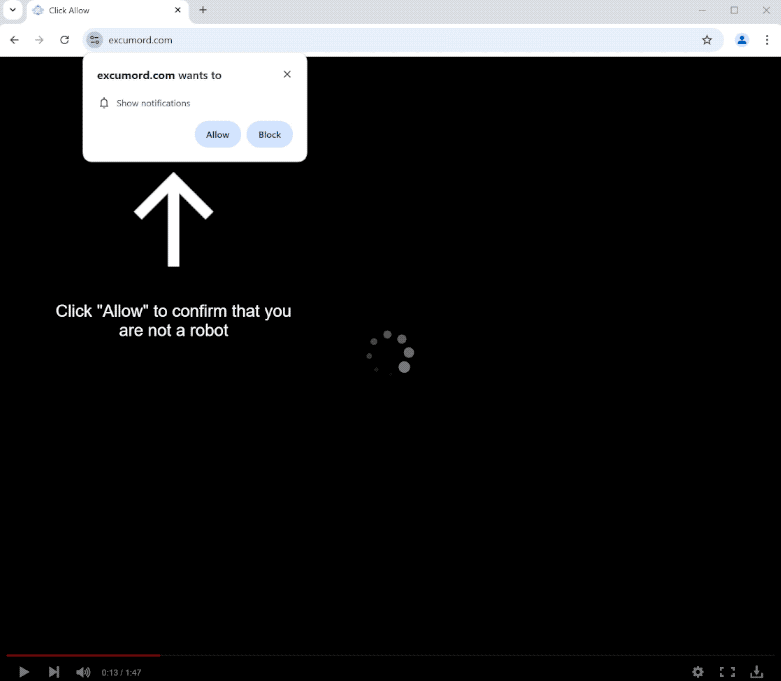Remove excumord.com notifications
excumord.com is a scam website that you may get redirected to when browsing ad-heavy sites. The site intends to trick users into allowing ads on the desktop by misusing a legitimate browser feature that allows sites to request permission to show notifications on users’ desktops. Instead of showing interesting content, sites like excumord.com spam ads, some of which could be dangerous as they could expose you to scams and malware. Fortunately, even if you give the site permission, it’s not difficult to revoke it.
When you get redirected to excumord.com, a browser alert will immediately pop up saying “excumord.com wants to show notifications”. The site doesn’t have any content on it besides a fake video player that starts playing and suddenly stops. The site implies that if you click “Allow”, the video will start playing. This tactic may work on users who were trying to use a free streaming site to watch pirated movies and TV series. Keep in mind that if you click “Allow” on the browser alert, you’ll permit the site to bombard your screen with ads, some of which may resemble system notifications. Engaging with these ads could lead you to potentially harmful sites that promote scams or hide malware.
While the “show notifications” feature is a legitimate one and can be useful for safe websites, it is often exploited by sites like excumord.com. Fortunately, even if you give sites permission, you can revoke notification permissions for any site at any time if you no longer want to receive notifications from them.
If you find yourself being redirected regularly, it could indicate an adware infection on your computer. Just in case, scan your computer with WiperSoft anti-virus software. Furthermore, installing an adblocker program can help prevent ads, particularly when navigating ad-heavy websites.
What triggers redirects to sites like excumord.com
Redirects to websites like excumord.com usually happen when users visit questionable sites without an adblocker program installed on their devices. Many sites aggressively display ads, which means numerous pop-ups and unwanted redirects. Websites that feature pirated or adult content tend to trigger these redirects regardless of what users click on. Fortunately, users can easily block both ads and redirects using a reliable adblocker program.
If adware is responsible for the redirects, they will happen frequently, often accompanied by an increase in regular advertisements. While adware is generally viewed as a minor threat, the incessant barrage of ads can be quite annoying. Adware, along with browser hijackers and similar infections, typically gets installed through a method called software bundling. This method allows these unwanted programs to be bundled with popular free software as extra offers and installed automatically unless the user opts out. Although these additional offers can be declined, they are hidden in settings users rarely check. Due to this deceptive method, programs that use it can be flagged as potential threats by anti-virus programs.
To avoid unwanted installations, all you need to do is pay attention when installing free programs. Users are usually given the choice between Default and Advanced settings during program installation. Default settings, while recommended by the installation window, allow all bundled offers to be installed without explicit consent. In contrast, Advanced settings will clearly display each offer, giving you the ability to opt out of any you don’t want. It’s best to uncheck all offers, even if they seem helpful at first, to prevent cluttering your computer with junk.
How to stop excumord.com redirects
Scan on your computer using an anti-virus program like WiperSoft if you’re encountering redirects. This could indicate an adware infection, which is best dealt with using anti-virus software due to its persistent nature. To avoid redirects and unwanted advertisements, it’s also a good idea to install a reliable ad blocker, particularly if you often browse ad-heavy sites.
You can easily revoke a website’s permission to send notifications through your browser’s settings. If you need help with this, we’ve included instructions below. Besides removing excumord.com, make sure to eliminate any other unfamiliar websites as well. If you prefer not to receive notification requests anymore, you can disable them entirely.
- For Mozilla Firefox: Open Menu (the three bars top-right corner) -> Options -> Privacy & Security. Scroll down to Permissions, press Settings next to Notifications, and remove excumord.com and any other questionable websites. You can permanently turn off these notification requests by checking the “Block new requests asking to allow notifications” box in the same Notifications settings.
- For Google Chrome: Open Menu (the three dots top-right corner) -> Settings -> Privacy and security -> Site Settings. Click on Notifications under Permissions, and remove excumord.com and any other questionable websites. You can stop these notification requests permanently by toggling off “Sites can ask to send notifications”.
- For Microsoft Edge: Open Menu (the three dots top-right corner) -> Settings -> Cookies and site permissions -> Notifications. Review which sites have permission and remove excumord.com and any other questionable websites. You can permanently turn off these notification requests by toggling off “Ask before sending”.
Site Disclaimer
WiperSoft.com is not sponsored, affiliated, linked to or owned by malware developers or distributors that are referred to in this article. The article does NOT endorse or promote malicious programs. The intention behind it is to present useful information that will help users to detect and eliminate malware from their computer by using WiperSoft and/or the manual removal guide.
The article should only be used for educational purposes. If you follow the instructions provided in the article, you agree to be bound by this disclaimer. We do not guarantee that the article will aid you in completely removing the malware from your PC. Malicious programs are constantly developing, which is why it is not always easy or possible to clean the computer by using only the manual removal guide.

